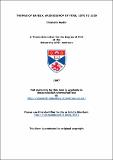Thomas of Bayeux, Archbishop of York, 1070-1100
Abstract
This study considers the career of Thomas of Bayeux, the first Norman
archbishop of York. Through the patronage of William of Normandy and his
half-brother, Odo, Thomas rose from treasurer of Bayeux to royal chaplain, and
then to archbishop of York. Thomas' notorious "loss" of the primacy dispute
has been misrepresented, for the archbishop made only a qualified profession
to Lanfranc, and none to Anselm. Other aspects of Thomas' archiepiscopate
have been equally misunderstood or neglected. In re-evaluating Thomas of
Bayeux's career, this thesis draws on archiepiscopal acts and letters, charters,
chronicles, Domesday Book and ancillary surveys, and the architectural
remains of York's Norman minster.
In his capacity as metropolitan of the northern province, Thomas of
Bayeux granted his first undisputed suffragan, St. Cuthbert's, Durham, special
privileges. The archbishop also capitalized on Lanfranc's empty grant of
Scotland to annex two more suffragans to his province. Thomas offset York's
loss of Lincoln and Worcester with St. Andrews and Orkney, freeing the
province from Canterbury's assistance at northern consecrations.
As diocesan, Thomas ministered to the collegiate churches at Ripon,
Beverley, and Southwell by drawing on flourishing chapters to bolster weaker
institutions. Where circumstances permitted, the archbishop reconstituted
collegiate churches to mirror changes at the mother church, but the
archbishop also recognized the Anglo-Saxon virtues of canonical common life.
Relations between secular and monastic foundations in Thomas' diocese prove
rosier than current opinion has allowed. Thomas not only countenanced but
supported the growth of the Benedictines in the north.
In his own church of St. Peter's, York, Thomas transformed a tiny,
quasi-monastic chapter into a body of canons endowed with dignities and fixed
prebends, and poised for mensal independence, The archbishop's use of
prebendaries to develop waste land should not be overstated. Domesday
entries, Thomas' patronage of York's ancient hospital, and the unusual
architectural arrangement of the new Norman cathedral testify to the
archbishop's pastoral commitment to his flock.
Eloquent, good-natured, and the best musician of his age, above all
Thomas proved a shrewd politician. He dealt strategically with two royal
courts, weathered the destruction of a patron (Odo of Bayeux) and a suffragan
(William of St. Calais), and established a secular cathedral during the height of
a monastic revival, without making an enemy. Interesting in its own right,
Thomas' career tells us much about the northern province's post-Conquest
history and York's secular "reform", and ultimately about politics and
patronage in the Anglo-Norman church.
Type
Thesis, PhD Doctor of Philosophy
Collections
Items in the St Andrews Research Repository are protected by copyright, with all rights reserved, unless otherwise indicated.

